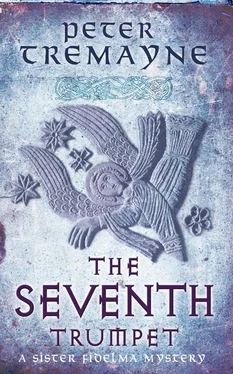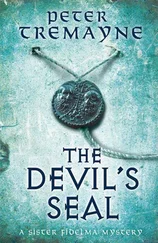Peter Tremayne - The Seventh Trumpet
Здесь есть возможность читать онлайн «Peter Tremayne - The Seventh Trumpet» весь текст электронной книги совершенно бесплатно (целиком полную версию без сокращений). В некоторых случаях можно слушать аудио, скачать через торрент в формате fb2 и присутствует краткое содержание. Год выпуска: 2012, ISBN: 2012, Издательство: Headline, Жанр: Исторический детектив, на английском языке. Описание произведения, (предисловие) а так же отзывы посетителей доступны на портале библиотеки ЛибКат.
- Название:The Seventh Trumpet
- Автор:
- Издательство:Headline
- Жанр:
- Год:2012
- ISBN:9780755377527
- Рейтинг книги:5 / 5. Голосов: 1
-
Избранное:Добавить в избранное
- Отзывы:
-
Ваша оценка:
- 100
- 1
- 2
- 3
- 4
- 5
The Seventh Trumpet: краткое содержание, описание и аннотация
Предлагаем к чтению аннотацию, описание, краткое содержание или предисловие (зависит от того, что написал сам автор книги «The Seventh Trumpet»). Если вы не нашли необходимую информацию о книге — напишите в комментариях, мы постараемся отыскать её.
The Seventh Trumpet — читать онлайн бесплатно полную книгу (весь текст) целиком
Ниже представлен текст книги, разбитый по страницам. Система сохранения места последней прочитанной страницы, позволяет с удобством читать онлайн бесплатно книгу «The Seventh Trumpet», без необходимости каждый раз заново искать на чём Вы остановились. Поставьте закладку, и сможете в любой момент перейти на страницу, на которой закончили чтение.
Интервал:
Закладка:
Peter Tremayne
The Seventh Trumpet
CHAPTER ONE
Tóla paused on the threshold of his farmhouse, looked towards the black mounds of the eastern hills, standing out sharply against the white bar of light that heralded dawn, and breathed in deeply before exhaling in a satisfied fashion. It was an action that had become a regular ritual each morning over many decades. He stood for a moment, gazing at the sky and estimating what sort of day it might bring before turning his attention to the dark, undulating land that spread southward before him. The light of the new day was spreading rapidly towards the thrust of rock which dominated the southern skyline just a few kilometres away. The grey-white buildings of The Rock of Cashel, which constituted the capital of the rulers of Muman, were already sparkling in the dawn light.
Tóla took a step forward and stretched languidly. He was a thickset and muscular man; a man whose very frame seemed to proclaim that he was a son of the soil; a man used to working the land and caring for the livestock. The rising sun glinted on his blue-black hair, enhancing his tanned skin and pale eyes. His features had been coarsened and aged by his outdoor life, but they were neither ugly nor unkindly. He stood like a man content with his life and all he surveyed.
There was a rustle from nearby and a large, rough-coated hound trotted round the building and whined in greeting, accompanied by quick movements of its tail. Its quiet, easy nature belied its intimidating appearance. The man bent and petted the heavy head, making a soft grunting sound as the dog gave another whine. Then Tóla turned back to the door behind him and called out: ‘It will be a good day today.’
A woman appeared, framed in the door, rubbing her hands on an apron and glancing towards the eastern hills. She was as tanned as Tóla; a pleasant, well-built woman, used to hard work.
‘Good enough to finish the harvest?’
‘Good enough, Cainnear. We can finish the small field today and then all the grain will be in.’
‘You had best check the heifer that’s still in calf before you do so,’ the woman advised.
‘She’s been slow, that one,’ agreed her husband. ‘The rest of the calves are already out to pasture. I’ll go and see how she is. She was down by the stream last night — she’s probably given birth by now.’ Then he paused. ‘I suppose that our lazy son is not yet stirring? Better get him out of bed — there is a great deal to be done.’
‘I will so, and join you in the small field later,’ Cainnear replied with a smile.
The farmer nodded absently and, with his dog trotting at his heels, he went to the shed at the back of the bothán , the stone-built cabin in which they lived, and collected a scythe and rake. Balancing them easily over one broad shoulder, he began to stroll across the fields towards the distant dark line of trees which marked the path of the little stream that was the southern border of his farmlands. The stream flowed west to join the great river called the Suir, which provided the western border of his land.
It was fully light by the time he had reached the small area of wheat that still needed to be cut. Soon it would be the moon which was called Gealach na gcoinnlíní — the moon of the stubble. This marked the time when all the grain crops should be cut down to their stalks and harvested. He paused and cast an eye over the field and then pursed his lips in a soundless whistle as if in approval. It would not take long to complete the harvest now. Thanks be; it had been a good harvest and a good year, for he had not lost one cow, pig or chicken to ill-fortune nor to predators. That thought prompted him to peer towards the treeline to look for his heifer, which had been waiting for her first calf. It was late. He hoped the calf had come during the night for, if it had not, the animal would be in difficulty. It was still too shadowy to make out much among the dark treeline. Placing the scythe and rake by the cornerstone of the field, he strode across the stubble towards the trees, his dog panting behind him.
He was nearing the trees when the dog suddenly halted, raised its head, as if sniffing the air, and gave a soft growl.
‘What is it, Cú Faoil?’ Tóla spoke quietly, unable to see anything untoward. Then he spotted a dark shadow at the far end of the field: it was a heifer no longer, for the smaller shadow of a calf stood by it. He smiled in relief before he realised that his dog was not looking in that direction — and the growl was still rumbling in its throat. Tóla looked cautiously in the same direction, but could see nothing. He advanced slowly, the dog obediently following, head up, alert and wary. Tóla knew that Cú Faoil, his loyal protector, was able to perceive danger before any human could. Tóla also knew that if there was scent of a predator, the animal would be more vocal in its warning. Indeed, if there were an immediate danger, then the cow, with its newborn calf, would not be standing docilely at the other end of the field. Yet something was not quite right.
The gushing of the stream behind the trees was loud at this point. This was because the waters frothed over a series of stepping stones which people often used as a pathway to the far bank. Unless travellers moved along the eastern bank of the Suir, or had access to a small boat, they had to turn along the path by this stream, called the Arglach, and make their way to this crossing through the shallows in order to continue south. On the southern side they could join the track that eventually led to the fortress of Cashel and its surrounding township. Tóla had lived all his life in this area. He expected the waters of the stream to resound against the stepping stones at this crossing-point. But his sensitive hearing picked up a different note — that of a stream in flood. He was aware that Cú Faoil had heard it too, and again the low rumble came from its throat.
Tóla walked through the trees and on to the path by the stream. At once he could see that the stones of the crossing were blocked by something which caused the waters to gush around and over them. What he saw made the breath catch in his throat.
Lying in midstream, as if fallen from the stepping stones, was a body.
Tóla moved swiftly, the cold waters coming up to his knees, and reached down to take a firm grip of the body’s clothing. Tóla was a strong man, befitting one who had worked the land all his life. Even so, it was a burdensome task to pull the body back to the bank, fighting the clawing pressure of the water which tried to press it against the stepping stones. Soon, however, the body was out of the water and stretched on the bank.
Having taken a few deep breaths to recover, Tóla examined it. The man, who had not been long dead, was young and good-looking. Moreover, the clothes he wore were of good quality and they were embroidered with fine needlework. A gold chain was still around his neck and a large ring with a semi-precious stone sparkled on his finger. The man was clearly someone of rank. He wore a short, brightly coloured cloak, pinned at one shoulder with a brooch of fine workmanship crafted in the form of an emblem. His bejewelled dagger still rested in a sheath on the left side of his belt, and his sword remained in its scabbard on the right-hand side.
Tóla raised a hand to the back of his head and rubbed it in puzzlement as he gazed at the corpse. His first thought was that the young man must have slipped and fallen from the wet stepping stones, possibly hitting his head in the darkness. But what would a young man of position be doing, travelling in such a place as this and without a horse? It was all very perplexing, not to say worrying. For a youth of rank to meet his death, even by accident, on Tóla’s farmlands could mean big trouble for him. Tóla vaguely remembered something about liability under the Law of Compensation.
Читать дальшеИнтервал:
Закладка:
Похожие книги на «The Seventh Trumpet»
Представляем Вашему вниманию похожие книги на «The Seventh Trumpet» списком для выбора. Мы отобрали схожую по названию и смыслу литературу в надежде предоставить читателям больше вариантов отыскать новые, интересные, ещё непрочитанные произведения.
Обсуждение, отзывы о книге «The Seventh Trumpet» и просто собственные мнения читателей. Оставьте ваши комментарии, напишите, что Вы думаете о произведении, его смысле или главных героях. Укажите что конкретно понравилось, а что нет, и почему Вы так считаете.











